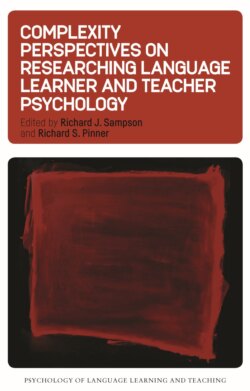Читать книгу Complexity Perspectives on Researching Language Learner and Teacher Psychology - Группа авторов - Страница 6
На сайте Литреса книга снята с продажи.
ОглавлениеContents
Contributors
1Introduction: [simple and complex?]
Richard S. Pinner and Richard J. Sampson
2Reflections on Researching Dynamics in Language Learning Psychology
Peter D. MacIntyre, Sarah Mercer and Tammy Gregersen
3Interacting Levels and Timescales in the Emergence of Feelings in the L2 Classroom
Richard J. Sampson
4Working with the Complexity of Language Learners’ Emotions and Emotion Regulation Strategies
Rebecca L. Oxford and Christina Gkonou
5Nested Systems and their Interactions: Dynamic WTC in the Classroom
Tomoko Yashima
6Researching the Complexity of Silence in Second-language Classrooms
Lesley Smith and Jim King
7Researching Motivational Resonance Hands-on: Learner Self-concepts, Learning Groups and Educational Cultures
Joseph Falout
8Understanding Motivation through Ecological Research: The Case of Exploratory Practice
Sal Consoli
9Complexity as a Valid Approach in ‘Messy’ Classroom Contexts: Promoting More ‘Ecologically Rich’ Research on the Psychology of L2 Listening
Kedi Simpson and Heath Rose
10Equifinality Approach to Exploring the Learning Trajectories of Language Learners and Teachers
Takumi Aoyama and Takenori Yamamoto
11Understanding Complexity in Language Classrooms: A Retrodictive Approach to Researching Class Climate
Ryo Nitta and Yoshiyuki Nakata
12Investigating Group-DMCs and Complexity in the L2 Classroom
Christine Muir
13The Complexity Lens: Autoethnography and Practitioner Research to Examine Group Dynamics
Richard S. Pinner
14A Collection of Contradictory Selves: The Dialogical Self and the Dynamics of Teacher Identity Transformation
Alastair Henry
15Using Microgenetic and Frame Analysis in Language Teacher Cognition Research
Anne Feryok
16Doing Complexity Research in the Language Classroom: A Commentary
Ema Ushioda
Glossary
Subject Index
Author Index
